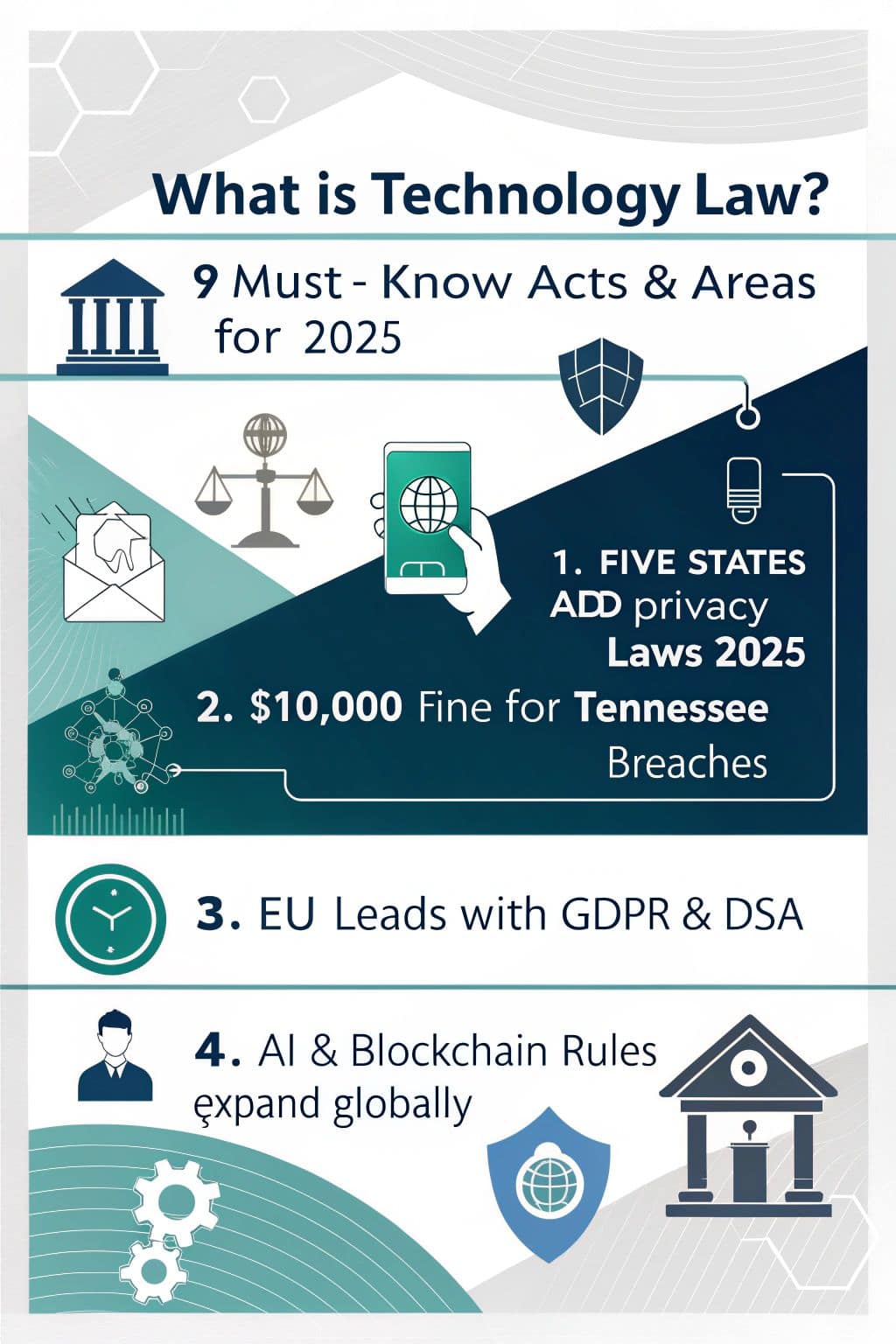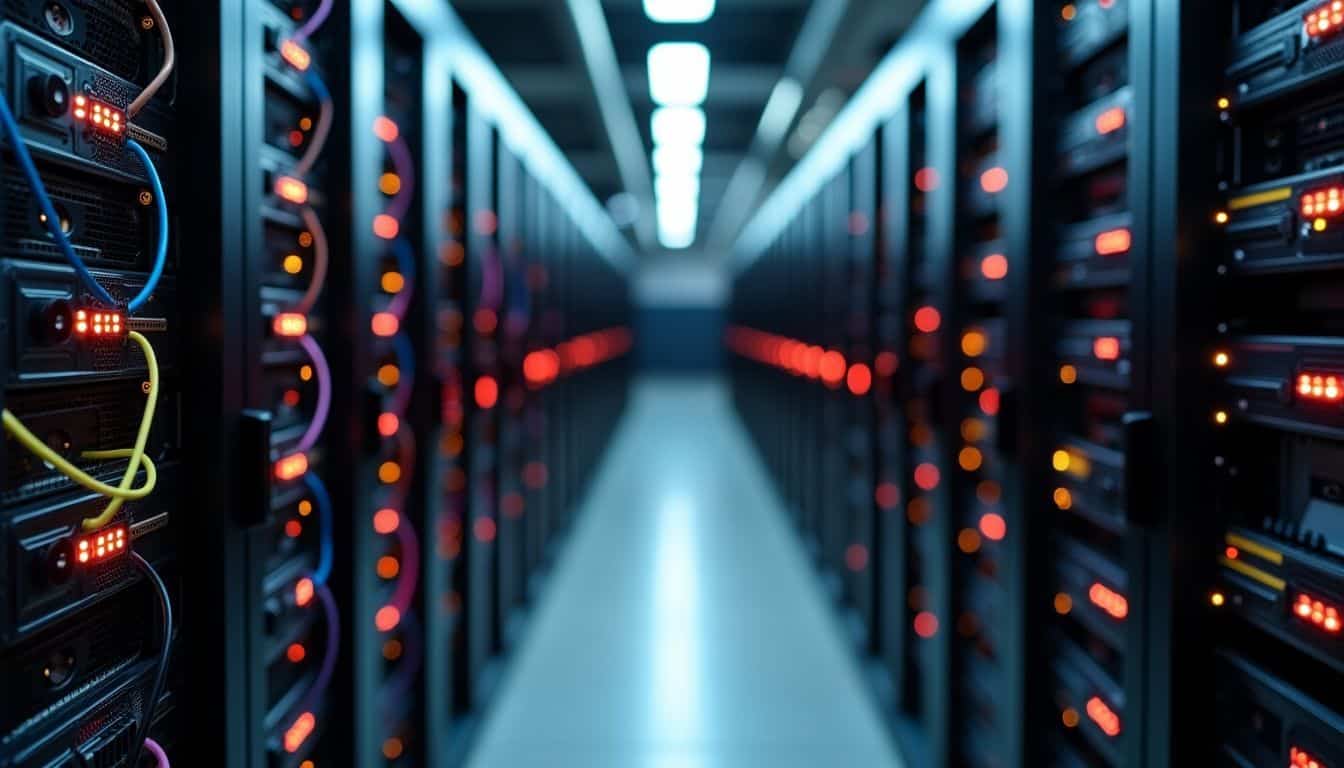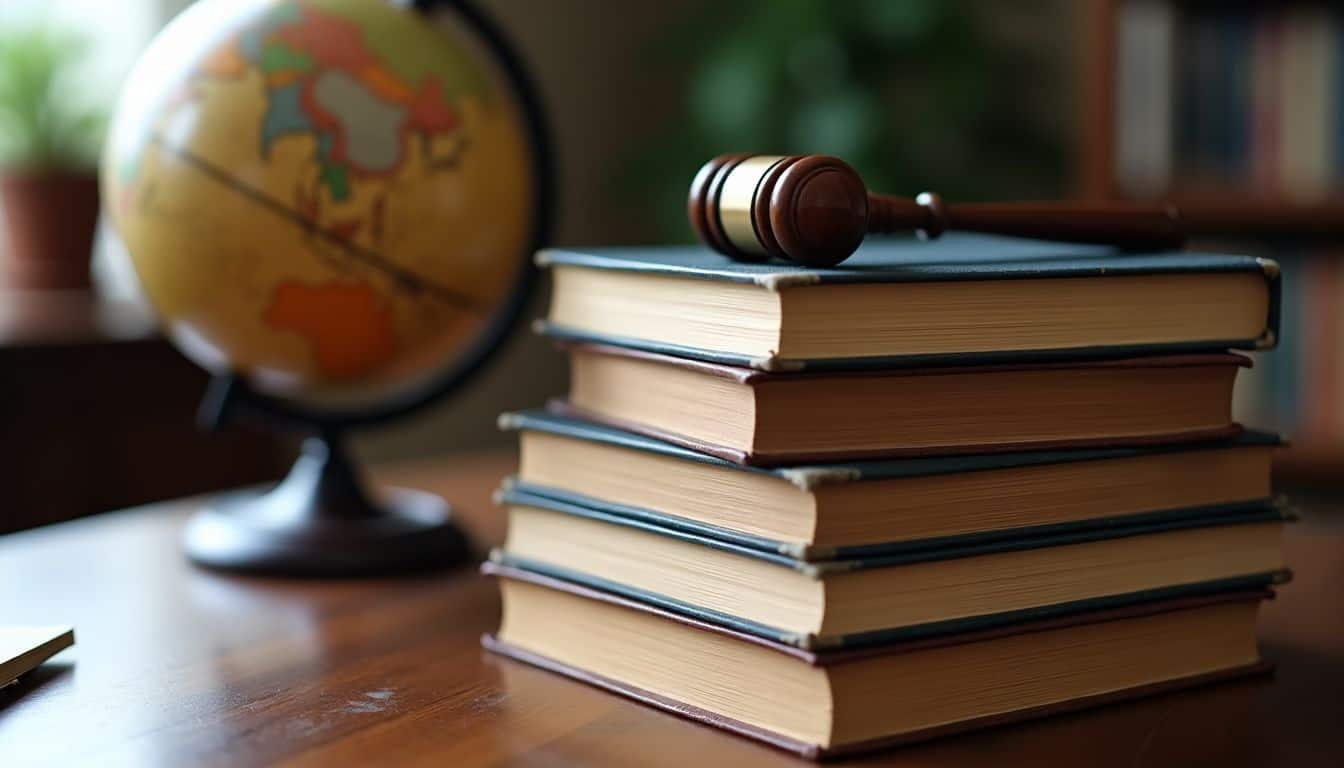Many people struggle to understand their rights in today’s digital world. Technology law shapes how we use phones, computers, and the internet every day. This guide breaks down “what is technology law” into nine key areas and laws you need to know for 2025.
Get ready to master the basics of data privacy, cyber security, and digital rights.
Key Takeaways
Technology law covers nine key areas including data privacy, cyber security, and digital rights. It blends contract law, privacy rights, and data protection to handle modern tech issues through courts and legal frameworks.
Five U.S. states – Delaware, Iowa, Nebraska, Maryland, and New Jersey – will launch new privacy laws in 2025. Companies face fines up to $10,000 for each data breach under Tennessee’s NIST privacy rules.
Major tech laws include the Privacy Act of 1974, Electronic Communication Privacy Act of 1986, and Gramm-Leach-Bliley Act of 1999. These laws protect personal data, digital communications, and financial information from misuse.
The EU leads global tech regulation with GDPR and Digital Services Act. China blocks websites through its “Great Firewall,” while Section 230 shields U.S. platforms from user content liability.
Emerging tech issues focus on AI, blockchain, and IoT devices. 33 states formed AI committees in 2024, and Colorado’s AI Act starts in 2026. The EU’s MiCA regulation now governs crypto markets.
Table of Contents
Defining Technology Law

Technology Law governs digital life and tech innovations. According to the trial lawyers at Chopin Law Firm, this legal field covers software, artificial intelligence, internet rules, and virtual spaces.
Tech law blends several areas like contract law, privacy rights, and data protection to handle modern tech issues.

Tech lawyers deal with information security, data breaches, and intellectual property rights daily. The field includes rules about software licenses, online privacy, and digital communications.
Tech law protects both users and companies through clear guidelines on data use, cyber security, and fair digital practices. Courts apply these rules to solve disputes about website content, social media posts, and tech company operations.
Key Areas of Technology Law

Technology law spans across multiple sectors and affects every digital interaction we make. Legal experts focus on four main areas – IT law, internet regulations, tech-related intellectual property, and data protection rules – to protect both users and businesses in the digital space.
Information Technology Law

Information Technology Law sets rules for digital systems and computer networks. This branch focuses on legal issues tied to software licenses, data privacy, and electronic communications.
Legal experts must grasp both technical aspects and legal frameworks to handle cases about digitized information sharing. Most disputes center on end-user agreements, product liability, and cross-border commerce conflicts.
The right to privacy is the right to be left alone – Louis Brandeis
Software patents and cybersecurity form major pillars of IT law practice. Companies need strong data privacy measures under current encryption regulations. Export controls affect how businesses share tech across borders.
https://www.youtube.com/watch?v=5BHGGYmVqnw
The rise of open-source licenses has created new challenges for lawyers who deal with intellectual property rights. Internet Law presents another crucial area where IT regulations play a vital role.
Internet Law

Internet law deals with the rules that govern online activities and digital interactions. The lack of universal laws creates major challenges for courts and businesses across borders.
A single online transaction can trigger laws in multiple countries – like a U.S. user buying from a U.K. seller through Canadian servers. Two main bodies oversee internet governance: the International Telecommunication Union (ITU) and the Internet Corporation for Assigned Names and Numbers (ICANN).
The European Union leads the way in creating strict internet regulations. The EU has passed several key laws like the General Data Protection Regulation (GDPR) for privacy rights and the Digital Services Act for online safety.
These laws affect how companies handle personal data, fight fake news, and protect users worldwide. The next section explores how intellectual property rights work in the digital space.
Intellectual Property in Technology

Intellectual property rights protect tech innovations through patents, copyrights, and trade secrets. Tech companies must guard their IP assets to stay ahead in the digital market.
The European Union took major steps in 2020 by creating 13 directives and 2 regulations to harmonize copyright laws. These laws now shield software code, digital content, and online platforms from theft or misuse.
Legal experts like John Perry Barlow and Lawrence Lessig shaped how we view IP rights in the digital age. The Digital Services Act and Digital Markets Act of 2022 brought fresh rules for fair use and content sharing.
These laws balance creator rights with public access to information. Software patents give inventors 20-year protection periods, while copyrights last much longer. Tech firms must follow strict IP guidelines or face costly legal disputes.
Data Protection and Privacy
 Data breaches and privacy risks have shaped modern tech laws since 1890. The Privacy Act of 1974 marked a crucial shift in U.S. data protection rules. Eight states plan to roll out fresh privacy laws by 2025, showing how fast this field grows.
Data breaches and privacy risks have shaped modern tech laws since 1890. The Privacy Act of 1974 marked a crucial shift in U.S. data protection rules. Eight states plan to roll out fresh privacy laws by 2025, showing how fast this field grows.
Privacy laws now cover everything from medical records to online tracking. The Attorney General’s offices handle enforcement of these rules across the U.S., making sure companies follow strict data handling standards.
Privacy is not something that I’m merely entitled to, it’s an absolute prerequisite. – Marlon Brando
Tech companies must protect user data through specific security steps. The Electronic Communication Privacy Act stops others from reading private messages without permission. Free speech rights often clash with privacy needs online.
Internet filtering helps block unwanted access to private info. The Gramm-Leach-Bliley Act forces financial firms to explain how they share customer data. These rules affect how websites track visitors and store personal details.
Next, we’ll explore how domestic regulations shape technology law practices.
Regulation and Jurisdiction in Technology Law

Technology law spans across borders and creates unique legal challenges in our digital space. Different countries have their own rules about data privacy, cybersecurity, and online business – which makes tech companies deal with multiple sets of laws at once.
Domestic Regulations
U.S. states have started to create strict rules for data privacy and tech use. Five states – Delaware, Iowa, Nebraska, Maryland, and New Jersey – will roll out fresh privacy laws in 2025.
These laws aim to protect user data and stop cyber crimes like identity theft. Tennessee now pushes companies to follow the NIST privacy rules, with fines up to $10,000 for each breach.
Local laws work with federal acts to control how firms handle digital info. The Privacy Act of 1974 and Electronic Communication Privacy Act guide data use at state levels. Each state can make its own rules about internet filtering, free speech limits, and data storage.
This mix of state and federal laws creates clear paths for both users and tech companies to stay legal.
International Jurisdiction Challenges
Technology law faces major hurdles across borders due to different legal systems. A single online transaction can trigger laws in multiple countries at once. Take this real example: A basic purchase between a U.S. buyer and U.K.
seller through a Canadian server creates instant legal complexity across three nations. Each country has its own rules about data privacy, consumer rights, and contract laws.
The internet knows no borders, but laws do. – Jonathan Zittrain
Legal disputes in cyberspace create unique challenges for courts and lawmakers. China blocks certain websites through strict filtering systems, while countries like Iran and Saudi Arabia control internet access differently.
These varied approaches to internet censorship and freedom of speech make it hard to set standard global rules. Private international law tries to bridge these gaps, but conflict of laws remains a key issue in digital communications.
Major Laws and Acts in Technology Law

Technology laws protect your digital rights and keep your data safe. The U.S. Congress has passed many acts since 1974 to fight cyber threats and guard online privacy.
Privacy Act of 1974
The Privacy Act of 1974 stands as a key law that protects personal data privacy in federal systems. This law, found in 5 U.S.C. § 552a, sets strict rules for how government agencies handle your personal info.
Federal agencies must tell the public about their record systems through the Federal Register. The Act stops agencies from sharing your records without your written permission, except in twelve specific cases.
I worked with federal agencies to implement privacy protocols under this Act. The law gives you strong rights over your data. You can see your records, ask for changes, and know how agencies use your information.
Federal bodies must keep accurate records and protect them from threats. They need good reasons to collect personal details and must use the data only for stated purposes. Breaking these rules can lead to both civil and criminal charges.
Foreign Intelligence Surveillance Act of 1978
Building on privacy protections, Congress passed a stronger law to oversee intelligence gathering. The Foreign Intelligence Surveillance Act of 1978 created strict rules for monitoring foreign threats.
This law set up a special court called FISC (Foreign Intelligence Surveillance Court) to review surveillance requests.
FISA marks the first comprehensive framework for intelligence surveillance oversight in U.S. history.
Federal agencies must now prove their need to collect foreign intelligence data. The Act draws clear lines between domestic privacy rights and national security needs. FISC judges review each case to ensure agencies follow proper procedures.
Law enforcement teams must show solid proof before they can track foreign targets or gather intelligence information.
Electronic Communication Privacy Act of 1986
The Electronic Communications Privacy Act (ECPA) expanded on earlier surveillance laws to protect digital communications. Congress passed this law in 1986 to safeguard electronic data from government snooping.
The ECPA contains three main parts: the Wiretap Act stops real-time spying, the Stored Communications Act guards saved messages, and the Pen Register Act controls tracking of communication patterns.
This privacy law makes it illegal to intercept or share electronic messages without permission. The USA PATRIOT Act later added new rules to help fight terrorism while keeping privacy protections.
The ECPA requires law enforcement to get court approval before accessing private digital data like emails, texts, and phone records. Tech companies must follow strict rules about sharing user information with the government.
Gramm-Leach-Bliley Act of 1999
Congress passed the Gramm-Leach-Bliley Act in 1999 to modernize financial services. This law broke down old barriers between banks, investment firms, and insurance companies. It lets these businesses merge and work together under one roof.
Financial institutions must now create clear privacy rules to protect customer data.
Banks and other money firms must tell customers how they use personal info thanks to this privacy law. They need strong data protection systems to stop cyber attacks and data breaches.
Each company must explain their info-sharing practices in writing. Customers can opt out if they don’t want their details shared with outside groups. Many tech experts see this act as a major step for data privacy and cybersecurity rules in the U.S.
Homeland Security Act of 2002
The Homeland Security Act of 2002 marks a major shift in U.S. security policy. This law created the Department of Homeland Security (DHS) to protect against threats like cyberstalking and hacking.
The DHS now leads efforts in cybersecurity, immigration control, and transportation safety across the nation. Many tech experts praise its focus on digital security and data privacy protection.
The Act brought key changes for privacy and technology. It set up the first Privacy Office within a federal department to guard personal data. The law also requires digital systems to follow Section 508 rules, making technology accessible to people with disabilities.
These rules shape how government websites and apps work today. Net neutrality and emerging technologies remain hot topics for the DHS as cyber threats grow more complex. The rise of artificial intelligence poses fresh challenges for technology law enforcement….
Emerging Issues in Technology Law

Technology law faces new problems as social media and digital platforms grow bigger. Legal experts now tackle fresh challenges about online speech limits, data control, and internet access rules.
Net Neutrality
Net neutrality stands as a core principle of internet freedom. Internet Service Providers must treat all web traffic equally under these rules. The U.S. Federal Communications Commission set clear net neutrality guidelines in 2015.
These rules stopped ISPs from blocking or slowing down specific websites or services.
Free speech thrives through net neutrality on digital platforms. ISPs can’t charge extra fees for faster access to certain sites or apps. Many tech giants support these rules to keep the internet open and fair.
The debate splits between those who want innovation and those focused on ISP profits. Internet censorship remains a hot topic as we explore free speech issues in tech law.
Internet Censorship
Internet censorship creates a complex battle between free speech rights and government control. Article 19 of the Universal Declaration of Human Rights protects freedom of expression, yet many nations restrict online content.
China leads global censorship efforts through its “Great Firewall,” which blocks access to numerous websites and social platforms. Similar filtering practices exist in Singapore, Iran, and Saudi Arabia, where governments monitor and limit digital communications.
Digital rights groups fight against strict internet filtering laws across borders. The challenge lies in setting fair rules for data ownership and content control. Some countries block access to specific websites, while others monitor user activities.
These actions affect both personal privacy and free speech online. Global tech laws must balance public safety with basic human rights in the digital space.
Free Speech on the Internet
Free speech rights face new tests in the digital age. Section 230 of the Communications Decency Act shields online platforms from liability for user content. Recent debates push for reforms to this protection, especially regarding platform accountability.
Social media companies must balance content moderation with free expression rights. Many platforms now face pressure to protect children while maintaining open discourse. Legal experts, including an employment lawyer, often weigh in on these complex digital rights issues.
Platform liability changes could reshape online speech rules forever. The principle of end-to-end communication supports net neutrality and free expression online. Tech companies struggle to define acceptable speech limits across different regions.
State laws now target content moderation practices of major platforms. Free speech advocates worry about censorship risks from increased platform regulations. These issues directly affect how artificial intelligence and machine learning shape our digital interactions.
Net neutrality stands as another crucial factor in preserving digital rights…
Privacy in Technology Law

Privacy laws protect your personal data from misuse and theft in the digital space. Tech companies must follow strict rules about how they collect, store, and handle your private information, or they face heavy fines and legal action.
Reasonable Expectation of Privacy Test
The Supreme Court set a key privacy standard in 1967 through Katz v. United States. This legal test checks if people can expect privacy in different situations. Courts now use two main questions: Did the person want to keep something private? Would most people think that desire for privacy makes sense? The test helps judges decide if the government needs a warrant to search or monitor someone’s activities.
Digital technology has made this privacy test more complex. Smart devices track our daily habits, while social media shares our personal data. The rules must now cover new areas like cloud storage and GPS tracking.
Courts still use this test to protect civil rights in the digital age. The next big challenge lies in how privacy laws adapt to emerging technologies.
Evolution of Privacy Laws
Privacy laws have grown stronger since the basic privacy tests of the past. Modern laws now focus on data protection across digital platforms and networks. States lead this change, with 21 U.S. states passing new data privacy laws in 2024 alone.
Delaware and Iowa stepped up with fresh consumer protection rules for 2025. These laws set clear limits on how companies can use personal data. Strict fines up to $10,000 per violation push businesses to follow these rules carefully.
Digital privacy faces new challenges as technology grows more complex. The American Privacy Rights Act aims to shield children’s data from misuse online. Companies must now follow stricter rules about collecting and storing user information.
Data breaches force businesses to pay heavy penalties, often around $7,500 per case. Privacy laws keep changing to match new tech threats. State laws work together with federal rules to create stronger privacy shields for everyone.
Smart devices and social media platforms need constant legal updates to protect users’ rights.
Role of Technology Law in Emerging Technologies

Technology law shapes how we use new digital tools and services in 2025. Legal experts must create fair rules for smart devices, digital money, and computer programs that make their own choices.
Internet of Things (IoT) Regulation
IoT regulation shapes how smart devices protect our data and connect with each other. Legal experts team up with tech pros to create rules for IoT security and privacy standards. These rules make sure your smart home gadgets, fitness trackers, and other connected devices handle your info safely.
The current laws focus on device safety, data protection, and making different IoT products work together smoothly.
Many countries now demand strong security features in IoT devices right from the start. Smart device makers must build in data privacy safeguards before selling their products. The rules keep changing as IoT tech grows more complex.
Legal teams stay busy updating these rules to match new IoT features and risks. Clear standards help companies make better IoT products while keeping user data safe.
Artificial Intelligence and Machine Learning
Artificial Intelligence has created major shifts in legal work across the United States. Legal AI now handles tasks once done by entry-level lawyers, showing its growing power in the field.
In 2024, 33 states formed special AI committees to tackle these changes. The Colorado AI Act will start in February 2026, setting rules for AI use in legal settings.
Legal tech startups focus on making AI tools smarter through licensing deals. These deals help create better legal analysis systems that lawyers can trust. Data privacy remains a top concern as AI systems process sensitive legal information.
The rise of AI in law brings up new questions about intellectual property rights and trade secrets protection. Blockchain technology offers new ways to protect digital assets in the legal field.
Blockchain and Cryptocurrency Legalities
Blockchain technology faces strict legal rules in different parts of the world. The European Union passed the Markets in Crypto-Assets Regulation (MiCA) in 2022 to create clear rules for crypto markets.
This law sets up one system for all EU countries to handle digital assets. The U.S. takes a different path, with SEC Chairman Gary Gensler stating most crypto tokens count as securities.
These rules affect how people trade and use digital money across borders.
Legal battles shape the future of cryptocurrency in the United States. Major companies like Coinbase and Ripple deal with SEC lawsuits in 2025. These cases help define what counts as a security in the digital age.
The SEC wants to protect investors from fraud while crypto firms push for clearer rules. Smart lawyers now take a tech-neutral stance to handle these cases better. Data privacy and intellectual property laws also play big roles in blockchain regulation.
Importance of Technology Law

Technology law stands as a vital shield for our digital rights and safety. Legal experts protect people from cyber threats, fraud, and data breaches through strict rules and guidelines.
The field grows more crucial each day as digital platforms expand their reach into our daily lives. Tech law pros help companies follow complex rules while keeping user data safe.
Financial stakes run high in the tech law world, with major companies spending millions on legal compliance. Digital privacy laws guard personal info from misuse and theft. Smart contracts, AI systems, and cloud services need clear legal frameworks to work right.
Tech law creates trust between users and companies while pushing innovation forward in safe ways.
People Also Ask
What is technology law, and why does it matter?
Technology law covers rules about data privacy, cyber-law, and digital media. It helps protect people and companies from data breaches and settles legal disputes about technology use.
How does technology law protect children online?
The Children’s Online Privacy Protection Act (COPPA) keeps kids safe online. It controls how websites collect data from children and requires internet filtering software for their safety.
What are the key acts that affect digital markets?
The Digital Markets Act (DMA) and Digital Services Act (DSA) are major laws. They control how big tech companies operate and protect users through fair license agreements and trade secret rules.
How does technology law handle free speech online?
Technology law balances the freedom of speech with libel laws. It looks at how people express opinions in digital forums and communities while following international treaties.
What should I know about end user agreements?
End user license agreements are contracts between software makers and users. They spell out rules for using digital products and help avoid legal disputes about computer communications.
How does technology law affect copyright and file sharing?
The law covers copyright infringement and peer-to-peer file sharing. It deals with copy protection and sets rules about how people can share digital content without breaking laws.
References
https://www.nautadutilh.com/en/insights/technology-and-the-law-in-2025-five-things-you-need-to-know/ (2025-01-28)
https://www.kochanski.pl/en/new-technology-law-in-2025-what-will-the-new-year-bring/ (2025-01-14)
https://iamip.com/ip-trends-in-2025-what-to-expect-and-how-to-prepare/
https://wolfgreenfield.com/articles/key-ip-developments-2024-and-what-to-expect-2025 (2025-01-13)
https://www.whitecase.com/insight-alert/2025-state-privacy-laws-what-businesses-need-know-compliance (2025-01-21)
https://www.researchgate.net/publication/351171307_Jurisdictional_Issues_in_the_Digital_Age
https://www.justice.gov/opcl/privacy-act-1974
https://en.wikipedia.org/wiki/Foreign_Intelligence_Surveillance_Act
https://jatheon.com/blog/ecpa-explained/ (2024-09-10)
https://www.techtarget.com/searchcio/definition/Gramm-Leach-Bliley-Act
https://www.shredit.com/en-us/blog/gramm-leach-bliley-act-glba
https://www.dhs.gov/homeland-security-act-2002
https://en.wikipedia.org/wiki/Net_neutrality
https://www.researchgate.net/publication/225914259_Reasonable_Expectations_of_Privacy (2024-10-22)
https://natlawreview.com/article/what-expect-2025-ai-legal-tech-and-regulation-65-expert-predictions
https://www.globallegalinsights.com/practice-areas/blockchain-cryptocurrency-laws-and-regulations/ (2024-10-25)
